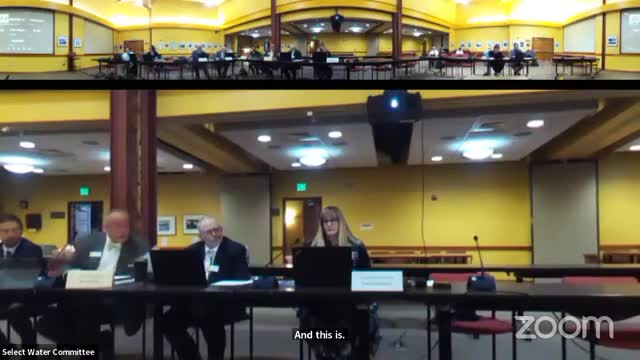Water Rights Debate Heats Up in Wyoming Legislature
August 08, 2024 | Select Water Committee, Select Committees & Task Force, Committees, Legislative, Wyoming
This article was created by AI summarizing key points discussed. AI makes mistakes, so for full details and context, please refer to the video of the full meeting. Please report any errors so we can fix them. Report an error »

In a recent government meeting, officials discussed the current state of groundwater statutes in Wyoming, highlighting the need for potential updates to laws that have remained largely unchanged since their inception in 1945. The meeting provided an overview of the existing regulations governing underground water rights, which are closely tied to surface water rights.
Key points included the vested rights associated with underground water usage, which are determined by the completion date of wells or registration with the state engineer. The discussion emphasized that while underground water rights share similarities with surface water rights, certain uses—such as watering for stock and household purposes—are granted preferred status under specific conditions.
Representatives raised questions about the complexities of these rights, particularly in scenarios where competing interests arise, such as irrigation versus domestic use. The state engineer's role was underscored, as they hold the authority to regulate water usage, issue permits, and enforce compliance with existing laws.
The meeting also touched on the concept of control areas, which can be established to manage groundwater resources effectively, especially in regions facing declining water levels or user conflicts. The state engineer can impose restrictions on water withdrawals in these areas to ensure sustainable use.
Additionally, the discussion included the management of byproduct water from non-water-related activities, such as mining, which can be appropriated under specific conditions. The state engineer's powers to oversee and enforce groundwater regulations were reiterated, including the ability to investigate complaints regarding unreasonable interference with water rights.
Overall, the meeting highlighted the importance of reviewing and potentially revising Wyoming's groundwater statutes to address contemporary challenges and ensure equitable access to this vital resource. Further discussions and inquiries are expected as stakeholders seek clarity on the implications of existing laws and the need for reform.
Key points included the vested rights associated with underground water usage, which are determined by the completion date of wells or registration with the state engineer. The discussion emphasized that while underground water rights share similarities with surface water rights, certain uses—such as watering for stock and household purposes—are granted preferred status under specific conditions.
Representatives raised questions about the complexities of these rights, particularly in scenarios where competing interests arise, such as irrigation versus domestic use. The state engineer's role was underscored, as they hold the authority to regulate water usage, issue permits, and enforce compliance with existing laws.
The meeting also touched on the concept of control areas, which can be established to manage groundwater resources effectively, especially in regions facing declining water levels or user conflicts. The state engineer can impose restrictions on water withdrawals in these areas to ensure sustainable use.
Additionally, the discussion included the management of byproduct water from non-water-related activities, such as mining, which can be appropriated under specific conditions. The state engineer's powers to oversee and enforce groundwater regulations were reiterated, including the ability to investigate complaints regarding unreasonable interference with water rights.
Overall, the meeting highlighted the importance of reviewing and potentially revising Wyoming's groundwater statutes to address contemporary challenges and ensure equitable access to this vital resource. Further discussions and inquiries are expected as stakeholders seek clarity on the implications of existing laws and the need for reform.
View full meeting
This article is based on a recent meeting—watch the full video and explore the complete transcript for deeper insights into the discussion.
View full meeting